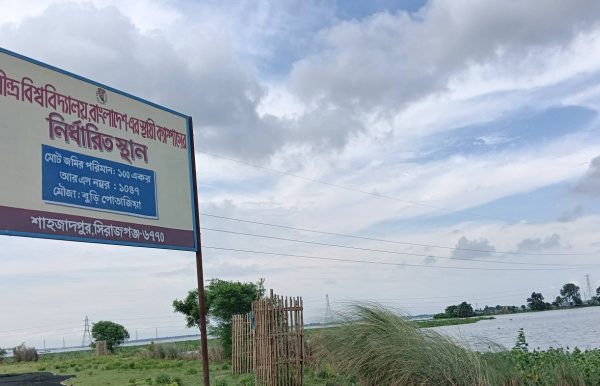Proposed Rabindra Univ campus in Chalan Beel: Environmentalists urge alternative sites
- Update Time : Monday, August 25, 2025

Staff Correspondent:
The permanent campus for Rabindra University in Shahjadpur, Sirajganj can be built in another part of Shahjadpur, even by acquiring land if necessary, instead of Ecnec-approved Chalan Beel land.
On 17 August, the Executive Committee of the National Economic Council (Ecnec) approved the establishment of the permanent campus in the wetland, conditional on securing environmental clearance from the Department of Environment (DoE).
The project, which allocated Tk519 crore and was scheduled from May 2025 to April 2029, drew objections from environmental activists over its location within the critical wetland system.
Experts and those engaged in protecting Chalan Beel had proposed three alternative sites, including part of the Sirajganj Economic Zone and a plot opposite Academic Building-3 (temporary) in Shahjadpur. However, the government has taken no initiative to build the university’s infrastructure in those areas.
Rabindra University began its academic activities in 2018. Since then, its operations have been running from eight rented buildings in Shahjadpur municipality. The university now has around 1,200 students. In response to their longstanding demand for a permanent campus, 100 acres of land have been earmarked within Chalan Beel at Buri Potajia.
Environment Adviser Syeda Rizwana Hasan inspected the site on 16 June. Her report noted the area remains submerged for four months every year and would need to be filled more than nine metres, requiring 3.66 million cubic metres of sand.
The report added that four acres already filled are obstructing Baral river’s flow, and filling the remaining 96 acres would severely disrupt Chalan Beel and the Baral river during monsoon.
Chalan Beel covers parts of six districts and 41 upazilas, including 47 rivers, 163 wetlands, over 300 canals, and 1,20,000 ponds. Nearly 10 million people depend directly or indirectly on its ecosystem. The proposed site at Buri Potajia sits at the confluence of Chalan Beel, Gohala, and Baral rivers. Building the campus there would obstruct water flow from 48 rivers descending from upstream.
WHAT ARE THE ALTERNATIVES?
Environmentalists argue the campus can be built in another part of Shahjadpur, even by acquiring land if necessary.
SM Mizanur Rahman, joint secretary of Bangladesh Poribesh Andolon (BAPA) and member-secretary of Chalan Beel Protection Committee, said, “Unplanned development is already threatening Chalan Beel’s survival. If a university is placed here, it will be the final nail in the coffin. Other encroachers will also gain legitimacy.”
He added, “We are not against building a university in the area, but it must be done while protecting life and nature. We want to save Chalan Beel.”
An official from the Department of Environment, requesting anonymity, told The Daily Sky: “The university authority wanted to take officials for inspection in the dry season to secure approval, but once the issue became public, our officers visited and concluded the site was unsuitable for clearance.”
Planning adviser Wahiduddin Mahmud said, “Even if ECNEC has approved the project, infrastructure work cannot begin without clearance from the Department of Environment.”
Professor Dr Feroz Ahmed, Director (Additional Charge) of the Office of Finance and Accounts of the university, told The Daily Sky, “We have heard that the university’s project has been approved by ECNEC, but we have not yet received any official documents. This 100-acre land for the university was designated by the government – we did not request this site. What we need for our campus is a suitable location where a complete campus can be built. We want the work on the permanent campus to begin without delay.”













